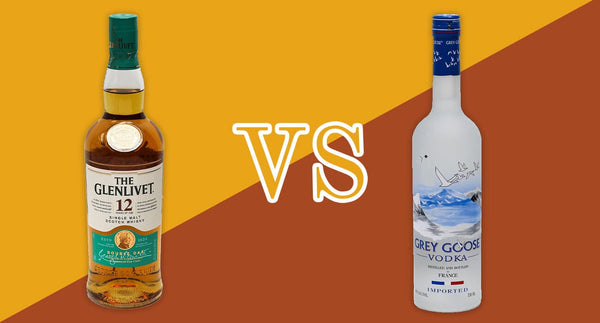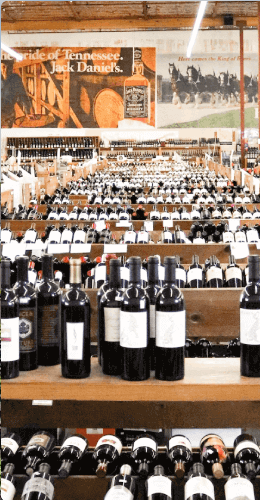Whisky versus Vodka: Bottle Barn Explains the Difference

Two different spirits. Two different colors. Two very distinct flavors. But whisky and vodka are also two of the most popular spirits in the world. These days, the online liquor store has an astounding variety of both spirits to try.
Whisky is a distilled spirit made from a fermented mash of cereal grains then aged in oak barrels. The barrel in which whisky is aged counts as a very important source for the flavor that qualifies it as whisky. A wide variety of grains are used in its production, including corn, malted barley, rye, and wheat.
After you buy whisky online, you will note the complex flavor characteristics of whisky include notes of wine, grains, fruit, floral elements, peat, fine nuances, sulfur, caramel, and wood, among many others.
Finally, whisky (or whiskey, when referring to spirits outside the U.S. or Ireland) refers to a broad range of spirits, including bourbon, Scotch, and rye. Labeling requirements are rigorously applied to all types of whisky.
What is Vodka?
The definition of vodka is simple. It is an alcoholic beverage produced by fermenting a starch with yeast (fruits can also be used).
The fermentation of grains like wheat, corn, rye, or potatoes is the most popular method for making vodka. Before diluting and filtering vodka, the alcohol must be distilled (at least three times) to remove impurities.
Some Differences between Whisky and Vodka:
Origins
The roots of whisky and bourbon are somewhat similar. Whisky first appeared in Scotland in 1494, 64 years after vodka was first made in Moscow. Like vodka, the Gaelic phrase "usquebaugh" means "water of life" for whisky. Unlike vodka, which is distilled and aged in a single process, whisky can be made through various methods.
Vodka originated in Eastern European countries like Russia, Poland, and Sweden. The Slavic term for water is the origin of the name "vodka." It is said that a monk named Isadore invented vodka in Moscow around 1430, a period now spanning over 500 years.
The Process
In alcoholic beverage production, distillation is always part of the process. A spirit is usually defined as anything with an ABV (alcohol by volume) higher than 16%. Before it can be sold, whisky must also be distilled. Whisky is made from grains like barley and wheat that have been distilled. While vodka is distilled from grains, whisky can also be made by distilling beer.
Owing to the significant influence that the fermentation vessel has on flavor, many whiskies are fermented in copper drums to highlight the drink's inherent flavors. The type of wood used to make the barrels influences the whisky's flavor, resulting in a lighter to darker brown liquid with a higher alcohol content. You can try different kinds when you order whisky online.
Distillation is used to create vodka, made from starch. The most common starches used in vodka production are potatoes, corn, rye, and wheat. After fermentation (the process of feeding yeast with sugar), the liquid is heated to a high temperature in a still. After the liquid has been vaporized and heated in the still, droplets are collected. Our favorite alcoholic drink, vodka, is made from these microscopic droplets. Additional distillation results in a smoother taste in vodka.
Owing to the additional alcohol content and the elimination of microorganisms, "high-end" vodkas (those distilled numerous times) tend to be more expensive. The best online liquor store, Bottle Barn, has many kinds to experience. To keep things interesting, some vodka producers may flavor their products with various ingredients. Once the distillation process is complete, the final product is packaged and sent to your local bar.
Alcohol, Flavor, and Aroma
The flavor of whisky can be muskier or sweeter depending on the type of grain or barrel used for aging. Most whiskies have a woody flavor and a warming effect on the palate. With 40% to 60% alcohol, whisky has a woody and rough aroma. It's easy to overlook the small differences between whisky and vodka, but these distinctions have a significant impact on how you enjoy your favorite alcoholic drinks. In the cocktail industry, vodka and whisky play a crucial role, and substituting vodka for whisky in a martini would be a mistake.
Vodka and whisky have high alcohol concentrations despite their distinct flavors, aromas, and production methods. Because vodka contains 60% water, it has a milder taste with a sharp aftertaste. As a result, vodka is often said to be "easy on the stomach" and can be paired with a wide range of beverages. Vodka also has a pleasant, non-overwhelming aroma.
Cocktail Options
A martini is a vodka cocktail where the main flavor comes from the ingredients added to the glass. Drinks made with whisky are designed to showcase the distinct flavors. For each one, we have compiled a list of the top five styles to experience. It’s easy to order whisky delivery California or vodka delivery California before you next cocktail party!
Using Whisky
Neat: It's refreshing to drink whisky neat. On the Rocks: Whisky with ice. Manhattan: The Manhattan is a classic cocktail that highlights the distinct flavor of whisky using vermouth and orange bitters. Old Fashioned: You can garnish your Old Fashioned with a cherry and an orange slice. Whisky Sour: An old-fashioned style with an extra touch of lemon juice.
Using Vodka
Cosmopolitan: Shows like Sex and the City made the Cosmopolitan famous. It has a pink hue from cranberries and a citrusy fruit flavor. Dirty Martini: A classic with vermouth and olive juice. This drink has a strong alcohol flavor because of the high vodka percentage. Bloody Mary: Tomato juice, spices, and garnishes like pickles make up the Bloody Mary, a popular weekend brunch drink. Moscow Mule: A mix of vodka and ginger beer. Espresso Martini: In an Espresso Martini, espresso and a coffee liqueur, like Kahlua, are blended with vodka for an extra kick.


















Leave a comment